Gender equality is a central component to development. Yet Pakistan currently ranks the second lowest country in the world for gender equality, according to the Global Gender Gap Index. As the sixth most populated country in the world and with a very high fertility rate of 3.8 children per woman, gaps in the fulfillment of women’s reproductive rights as well as the widespread prevalence of gender-based violence are at the forefront of gender inequality. Although efforts to promote gender equality are apparent within Pakistan’s Vision 2025, there is still much more to be done to improve the realities for women and girls across the country.
Barriers to access sexual and reproductive health rights, receiving quality education, fulfilling empowerment goals and entering the economic sphere are only some of the ways women are disadvantaged in Pakistan. Women suffer from pervasive gender-based violence, from domestic abuse, honour killings, sexual violence to institutional discrimination. There is a widespread lack of consistent access to quality family planning services in Pakistan, resulting in one of the highest unmet needs in Asia. This prevents women from meaningfully participating in educational and economic life outside of the household and from making informed choices about their sexual and reproductive lives.
Women in Pakistan are also the face of unyielding strength and represent some of the strongest voices demanding change. UNFPA is helping to improve their situation, giving further strength and support to amplify their voice.
Advocating for gender equality: a key to Pakistan’s development
UNFPA believes that gender equality will be achieved only when women and men enjoy the same opportunities, rights and obligations in all spheres of life. This means sharing equally in the distribution of power and influence and having equal opportunities for financial independence, education and realizing their personal ambitions. UNFPA strongly believes in the wide breadth of a woman’s potential and her capacity to make her own informed choices about her sexual and reproductive health and her empowerment over the course of her life.
Gender equality is a crosscutting theme that runs through all of UNFPA’s programmes. Gaining equal value in society, from the home to the workplace, and having equal representation and protection of women’s needs and rights in policies and law are all components necessary for gender equality.
UNFPA’s role
UNFPA raises awareness and promotes the implementation of national and provincial policies and laws that target discrimination and violence against women, developing the capacity of government departments and different sectors to actively mainstream gender issues in their daily work. UNFPA also works toward the elimination of harmful cultural practices, such as child marriage and develops the capacity of institutions and communities to move toward fundamental behavioural change. Gender equality is beneficial to women and men, boys and girls, families and communities alike, and is instrumental to Pakistan’s vision of development and empowerment.







